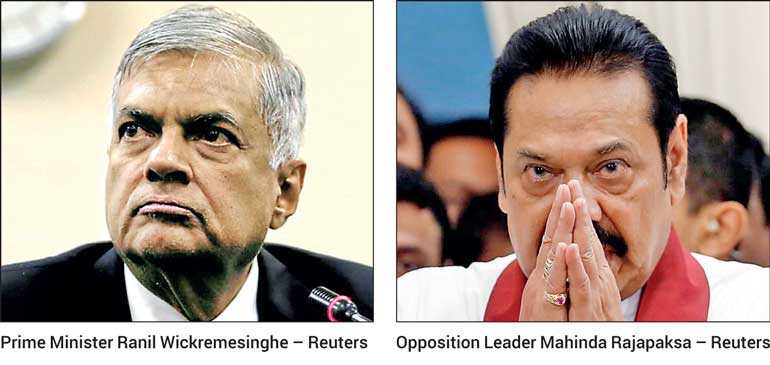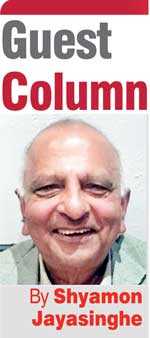Wednesday Feb 25, 2026
Wednesday Feb 25, 2026
Monday, 12 August 2019 00:16 - - {{hitsCtrl.values.hits}}

“The fundamental fact is that in a given political party, all members aren’t equal.”
Demand for open vote
The other day, Minister Eran Wickramaratne bemoaned that his own party, the United National Party, lacks democracy in its internal operations. This theme is doubtless going to be repeated by the Sajith Premadasa faction while pursuing its various gyrations and gymnastics to seek nomination for President from the Grand Old Party. The leader would be slandered directly and by innuendo by Sajith backers, and the lack of democracy would be the main line of criticism. Assuming they have majority power, the Sajith faction, to which Eran also presumably belongs, now demands an open vote among the Parliamentary group and the Working Committee to decide the candidate. On the face of it, that sounds reasonable. The practical situation on ground is, however, different from theoretical considerations.
Demolishing the theoretical justification
In this piece, I shall endeavour to demolish the theoretical justification for equality, and therefore, for an equal vote on this issue. The fundamental fact is that in any given political party, all members aren’t equal. A vote for a critical decision like this cannot be the mechanism used to name a candidate. 
Take any party and tell me if all members are equal – in Sri Lanka or anywhere else in the world. Every party wittingly or unwittingly develops a leadership caucus, which may be inside the formal institutions of that party or outside. These few numbers outnumber others. In the case of Mahinda Rajapaksa, it is the family.
Can you blame Mahinda for that? No. because Mahinda is the author of his party.
He and the caucus of his family navigated the party into government and while in government. Most others were mainly ‘also rans’, or bread recipients in the race headed by Mahinda. Mahinda used both legitimate and illegitimate influences to keep his side winning. He and his caucus carried the great risks that follow in defeat. Most of that caucus have now been indicted in court and they are trying their best to play hide and seek with justice. In such circumstance, how can another MP like S. B. Dissanayake or Gammanpila or Shantha Bandara enjoy equal status with Mahinda’s decision-making vote? Sounds senseless, doesn’t it?
United National Party
The same line of argument applies to UNP Leader Ranil Wickremesinghe and his caucus – whoever that may be. The Leader went through a hard time through over 20 years in Opposition and through the Rajapaksa regime era to keep fighting to save the UNP. In an era of white vans, the close caucus had to take dangerous risks. Seventeen of Ranil’s Ministers switched over to Mahinda for portfolios. The euphemism is that these persons had gone to ‘strengthen the hand of Mahinda during the War’. Some of them went over shamefully alleging that ‘the leader wasn’t good’. Johnston Fernando was one. Twice during this dark era, Ranil Wickremesinghe was challenged for leadership by Sajith Premadasa and Karu Jayasuriya. Ranil went through all these roadblocks. During the dark period, the UNP didn’t have funds flowing to its Treasury. Business sides were the only winners, and Ranil wasn’t one – until he did become one.
Keep Power
It is not only to win power. The leader had the challenging and creative task to keep and sustain power through the weird decisions of the President himself and the selfish interests of the factions.
Ranil Wickremesinghe’s handling of President Sirisena deserves our highest plaudit. He seems able to manage him so deftly and to go ahead with the Government’s program at the same time.
Had he adopted bull in a china shop tactics during the infamous 52 days, that would have been one blunder after another. No, it was his innate emotional management skills that got Ranil Wickremesinghe on top of the situation. There are those who say Ranil Wickremesinghe lacks a spine or ‘pitakonda’. The assumption of such an accusation is that a leader should employ muscle strength to get over a crisis. The UNP Leader is not the muscle type but the brainy type. One doesn’t need to waste one’s muscle when one can, more effectively, use one’s brain. This is the theme of the late Somalatha Subasinghe’s play, ‘Thoppi Welenda’.
Over to Eran
Now tell me, Eran, is your vote equal to Ranil Wickremesinghe’s or to any other of Ranil’s caucus who stood by him through thick and thin? You, Malik, Harsha De Silva and some others got into the party elite via nomination by the Leader. How many of the other Parliamentarians can claim they went through the same arduous struggle to win power? I can identify persons like Rajitha Senaratne, who precisely shared the sweat and risk of the struggle of competing with the Rajapaksa regime that had been known to be brutal. It is good to make a list.
Nominated MPs
Nominated MPs should be low down in such a list since they did not even have the task of spending large sums of money and wooing voters for power. Were it not for the Leader, these gentlemen would have been sulking in their old positions in society
Robert Michels and the Iron Law of Oligarchy
The theoretical claim for equality among members is, therefore, false. It follows that the wisdom of a great researcher in political theory, who wrote his classic ‘Political Parties’, was dead right even during his time in 1911. That man’s name was Robert Michels – a British sociologist. Michels’ book is a classic even to this day. He pointed out with evidence that there is an ‘iron law of oligarchy’ that drives the behaviour of political parties – wherever. I cite the following summary of the argument presented by Michels:
“According to Michels, all organisations eventually come to be run by a ‘leadership class’, who often function as paid administrators, executives, spokespersons or political strategists for the organisation. Far from being ‘servants of the masses’, Michels argues this ‘leadership class’, rather than the organisation’s membership, will inevitably grow to dominate the organisation power structures. By controlling who has access to information, those in power can centralise their power successfully, often with little accountability, due to the apathy, indifference and non-participation most rank and file members have in relation to their organisation’s decision-making processes. Michels argues that democratic attempts to hold leadership positions accountable are prone to fail, since with power comes the ability to reward loyalty, the ability to control information about the organisation, and the ability to control what procedures the organisation follows when making decisions. All of these mechanisms can be used to strongly influence the outcome of any decisions made ‘democratically’ by members.
Michels stated that the official goal of representative democracy of eliminating elite rule was impossible, that representative democracy is a facade legitimising the rule of a particular elite, and that elite rule, which he refers to as oligarchy, is inevitable.”
It asserts that rule by an elite or oligarchy is inevitable as an ‘iron law’ within any democratic organisation as part of the ‘tactical and technical necessities’ of organisation.
Further, Michels’ theory states that “all complex organisations, regardless of how democratic they are when started, eventually develop into oligarchies. Michels observed that since no sufficiently large and complex organisation can function purely as a direct democracy, power within an organisation will always get delegated to individuals within that group, elected or otherwise”.